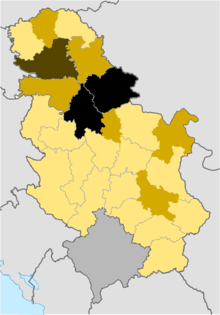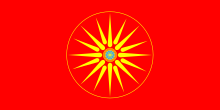Macedonians in Serbia
Македонци у Србији Makedonci u Srbiji Македонци во Србија | |
|---|---|
 | |
| Total population | |
| 14,767 Serbian citizens, 0.22% of Serbia's population (2022)[1] | |
| Regions with significant populations | |
| 7,021 (0,40%)[2] | |
| 4,293 (0.26%)[2] | |
| Languages | |
| Macedonian, Serbian | |
| Religion | |
| Macedonian Orthodox, Serbian Orthodox | |
| Related ethnic groups | |
| South Slavs | |
Macedonians in Serbia (Serbian: Македонци у Србији, romanized: Makedonci u Srbiji; Macedonian: Македонци во Србија) are a recognized national minority in Serbia. According to the 2022 census, the population of ethnic Macedonians in Serbia is 14,767, constituting 0.2% of the total population. The vast majority of them live in Belgrade and Pančevo.
History
The first session of the Anti-fascist Assembly for the National Liberation of Macedonia (ASNOM) was held on 2 August 1944, the anniversary of the Ilinden Uprising, at Prohor Pčinjski Monastery in the Bulgarian occupation zone of Yugoslavia, what is today southern Serbia, just north of the Macedonian border. The Assembly declared Macedonia the nation-state of Macedonians within Yugoslavia.[3] The monastery which is in the region of Macedonia, was ceded after WWII to SR Macedonia, but was transferred to SR Serbia in 1947.
In Bukles, Vojvodina, a center for refugees of the Greek Civil War was established in May 1945 through 1949. Among the refugees settled here were ethnic Macedonians.[4]

During the years 1945–1991 ethnic Macedonians and the Macedonian language were a constituent part of the Socialist Federal Republic of Yugoslavia.[5][6][7] Some ethnic Aromanians and particularly Megleno-Romanians from the Socialist Republic of Macedonia emigrated to the Serbian Banat and settled in villages such as Gudurica to repopulate them after the expulsion of their native German populations following World War II. As they were not recognized as a separate ethnic minority, they were counted simply as Macedonians and assimilated quickly. However, the Megleno-Romanian minority of Gudurica has not yet gone extinct, since as of 2014, 3 Megleno-Romanian-speakers remained in the village.[8]
Many Macedonians, due to economic reasons, migrated during the 1960s and 1970s to the Socialist Republic of Serbia (predominantly in Vojvodina). In 2004, Serbia and Macedonia signed an inter-state agreement on the protection of Macedonians in Serbia and Serbs in Macedonia.
| Year | Pop. | ±% |
|---|---|---|
| 1948 | 17,907 | — |
| 1953 | 27,277 | +52.3% |
| 1961 | 36,288 | +33.0% |
| 1971 | 42,675 | +17.6% |
| 1981 | 48,986 | +14.8% |
| 1991 | 45,068 | −8.0% |
| 2002 | 25,847 | −42.6% |
| 2011 | 22,755 | −12.0% |
| 2022 | 14,767 | −35.1% |
| From 1991, the census was not conducted on the territory of Kosovo Source: [1] | ||
Demographics
According to the 2022 census there were 14,767 Macedonians in Serbia.[1] The Macedonian population living in Serbia is concentrated in two cities, Belgrade and Pančevo. In Belgrade there are 6,970 Macedonians, while in neighboring Pančevo 4,558 - out of which vast majority live in three villages (Jabuka, Glogonj, and Kačarevo) that are within administrative limits of City of Pančevo. Additionally, Macedonians constitute significant population in Plandište municipality, especially in village of Dužine.
Vojvodina
Macedonians in selected South Banat settlements per Yugoslav and Serb censuses:
| Settlement | Municipality | 1961 | % | 1971[9] | % | 1981[10] | % | 1991[11] | % | 2002[12] | % |
|---|---|---|---|---|---|---|---|---|---|---|---|
| Dužine | Plandište | 223 | 35.8 | 143 | 35.8 | 90 | 31.9 | 84 | 35.9 | 68 | 31.1 |
| Glogonj | Pančevo | 1,001 | 31 | 976 | 29.9 | 1,201 | 33.3 | 818 | 23.5 | 367 | 11.5 |
| Gudurica | Vršac | 299 | 14.2 | 247 | 15.8 | 192 | 13.3 | 171 | 12.8 | 133 | 10.5 |
| Hajdučica | Plandište | 215 | 11.4 | 192 | 10.5 | 155 | 10.2 | 138 | 9.5 | 123 | 8.9 |
| Kačarevo | Pančevo | 3,117 | 40 | 3,298 | 41 | 3,205 | 38.6 | 2,473 | 30.5 | 1,467 | 19 |
| Jabuka | Pančevo | 3,471 | 66.2 | 3,325 | 61 | 4,179 | 64.8 | 3,177 | 48.2 | 2,054 | 32.5 |
| Pančevo | Pančevo | 597 | 1.5 | 1,095 | 2 | 1,662 | 2.4 | 1,748 | 2.4 | 1,196 | 1.6 |
| Plandište | Plandište | 1,111 | 31.7 | 1,065 | 28.3 | 1,027 | 24.9 | 1,038 | 23.7 | 910 | 21.3 |
| Velika Greda | Plandište | 181 | 9.3 | 168 | 9.5 | 163 | 10.3 | 171 | 11.3 | 136 | 9.9 |
| Vojvodina | n/a | 15,190 | 0.8 | 16,527 | 0.9 | 18,897 | 0.9 | 17,472 | 0.9 | 11,785 | 0.6 |
Politics
In 2005 Macedonians in Serbia also established a National Minority Council, which represents as a step towards safeguarding their interests. Jovo Radevski was elected as its president. The Democratic Party of Macedonians is the primary minority party. It is centered in Novi Sad.
| Part of a series on |
| Macedonians |
|---|
 |
| By region or country |
| Macedonia (region) |
| Diaspora |
|
|
|
|
|
Subgroups and related groups |
|
|
| Culture |
|
|
| Religion |
| Other topics |
Culture
Macedonian language is in the official use in the municipality of Plandište, where Macedonians constitute 9.2% of population. Macedonian-language print media consists primarily of the monthly political journal Makedonska videlina produced by the Macedonian Information and Publishing Centre in Pančevo. Limited Macedonian-language television is available through regional public broadcaster of Radio Television of Vojvodina and the local station TV Pančevo.
Associations such as "The Society of Serbian and Macedonian Friendship Šar – planina" seated in Belgrade, and the "Municipal Society of Serbian-Macedonian Friendship" seated in Zrenjanin cover issues related to ethnic, cultural and economic cooperation in Serbia.
Notable people
Academia & Arts
- Tijana Dapčević (born 1976), singer and actress
- Aleksandar Džambazov (1936–2022), conductor and composer
- Bogomil Gjuzel (1939–2021), poet, writer, playwright and translator
- Vladimir Gligorov (1945–2022), economist
- Zafir Hadžimanov (1943–2021), musician
- Maja Odžaklievska (born 1954), singer
- Lazar Ristovski (born 1952), actor, producer, director, and writer
- Nemanja Todorović Štiplija (born 1984), political scientist, heraldic, and social activist
Sport
- Dragan Čadikovski (born 1982), footballer
- Boško Gjurovski (born 1961), footballer, football manager, and politician
- Aleksandar Ignjovski (born 1991), footballer
- Igor Jančevski (born 1974), footballer
- Aleksandar Kirovski (born 1990), footballer
- Dragan Lukovski (born 1975), basketball player
- Nemanja Matić (born 1988), footballer
- Uroš Matić (born 1990), footballer
- Aleksandar Lazevski (born 1988), footballer
- Marko Pavlovski (born 1994), footballer
- Predrag Ranđelović (born 1990), footballer
- Dragoslav Šekularac (1937–2019), footballer and manager
- Goran Simov (born 1975), footballer
- Perica Stančeski (born 1985), footballer
- Milan Stojanoski (born 1973), footballer and manager
- Aleksandar Todorovski (born 1984), footballer
See also
References
- ^ a b c "Final results - Ethnicity". Почетна. 2023-07-14. Retrieved 2023-12-07.
- ^ a b "Population by ethnicity, by areas" (PDF). Retrieved 2023-12-07.
- ^ www.ajmonegde.com:Manastir Prohor Pčinjski, retrieved 21 December 2013
- ^ "Petite histoire des Grecs dans la Tchécoslovaquie communiste - entretien avec Ilios Yannakakis". Radio Prague International (in French). 2006-05-01.
- ^ Constitution of the Socialist Republic of Macedonia, 1974 – Official Gazette of the Republic of Macedonia (in Macedonian)
- ^ Устав Федеративне Народне Републике Југославије (1946), sr.wikisource.org, retrieved on 19 October 2007. (in Serbo-Croatian)
- ^ Устав Социјалистичке Федеративне Републике Југославије (1963), sr.wikisource.org, retrieved on 19 October 2007. (in Serbo-Croatian)
- ^ Sorescu Marinković, Annemarie; Măran, Mircea (2015). "Megleno-Romanians in Serbia – shifting borders, shifting identity". Contextualizing Changes: Migrations, Shifting Borders and New Identities in Eastern Europe. pp. 365–377.
- ^ 1971- Попис СФРЈ
- ^ 1981- Попис СФРЈ
- ^ 1991- Попис СФРЈ
- ^ "Official Results of Serbian Census 2002–Population" (PDF). Archived from the original (PDF) on 2013-10-18. Retrieved 2009-02-19. (441 KB) (in Serbian)
External links
- www.mhrmi.org-Website for Macedonian International Rights
- Association of Macedonians from Vranje
- Democratic Party of Macedonians

